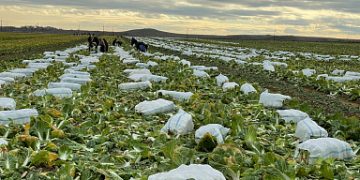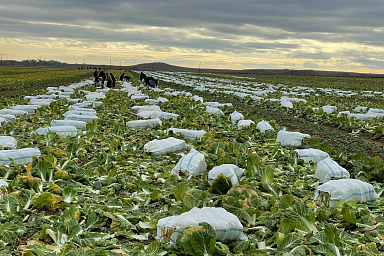These days, Chinese cabbage is being harvested in the Derbent region. Sharip Sharipov, First Deputy Minister of Agriculture and Food of the Republic of Dagestan, got acquainted with the harvesting progress. He was accompanied by the head of the Department of Agriculture Yusif Gereykhanov, the director of the Dagestan Experimental Station – a branch of the VIR, Professor Kishtili Kurkiev and the chief researcher of the FARC RD, Professor Magomed Baratov.
We visited the farm of Alibek Radjabov, which is located in the village of Muzaim. According to the farmer, he has grown Beijing cabbage on an area of 7 hectares, about 50 people are involved in the harvest, and plans to expand the area under vegetables with the provision of additional land.
As Yusif Gereykhanov noted, in the Derbent region, the area under Chinese cabbage is about 200 hectares.
According to First Deputy Sharip Sharipov, Dagestan is the cabbage region of Russia, which accounts for almost 19 percent of the total area under cabbage in our country and 80 percent of the total area of cabbage in the North Caucasus Federal District also falls on our region. In Dagestan, vegetable growing is quite well developed and the main resource is hardworking people. As for the Derbent region, over the long history of growing vegetable crops, they have mastered the nuances of the production of any kind of vegetables. In particular, the cultivation of Beijing cabbage has been practiced for the past ten years. This is a popular culture, useful for the prevention of a number of ailments, including depression, headaches, nervous disorders, diseases of the cardiovascular system. In the East, Beijing cabbage is called a source of longevity, as it is saturated with vitamins and useful trace elements.
In this area, natural and climatic conditions make it possible to cultivate cabbage even in the cold season. Muzaim vegetable growers have mastered this feature for several years. Therefore, it is not surprising that cabbage is harvested in January in the Derbent region. In winter, there are no pests and diseases, which means that there is no need to treat plantations with chemicals. This implies the quality and demand for vegetable products grown in winter.
“Due to climatic features, we see in the south of Dagestan, in this case the Derbent region, it is possible to grow several crops per year. Today we see that in the dead of winter Dagestan products go directly from the fields to the tables of consumers. This is our advantage – the ability to sell products directly from the field during off-season, in winter or early spring. I would like to note that this year a federal project to stimulate the production of open field vegetables and potatoes was launched. Dagestan, within the framework of this project, in which personal subsidiary plots can also participate, is working to increase the production of vegetables and potatoes,” said Sharip Sharipov.
- Latest
- Trending































